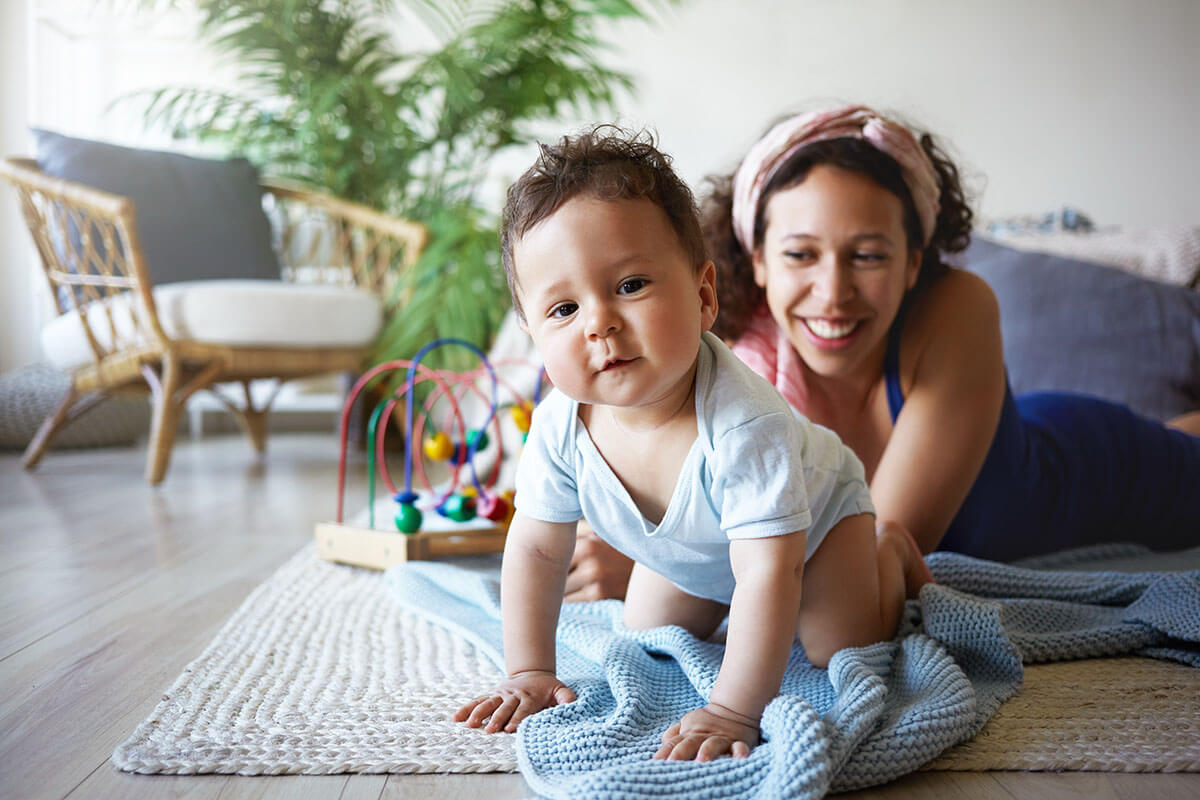Your baby as a social being
Month 9 to month 12: Baby can better distinguish between strangers and acquaintances. Baby shows more preference for familiar caregivers and strangers are greeted with restraint. Baby looks during play to see if adult is looking at him/her. Baby imitates parents immediately after simple movements and gestures occur. During this period, children go through a great development regarding their social-communicative skills. The ability to follow someone else's gaze direction/eye movements continues to develop. The child learns to direct the attention of others by pointing, or showing something to his parents or giving objects to other people. Language comprehension also develops at this age and the child begins to use symbolic gestures. The child can divide his attention between himself, someone else and object. From 9 months the child follows the gaze direction/eye movements of someone else, but also lingers at the first object within his field of vision, later also when the object is out of sight. Also, from 9 months the child develops such that intentional communication arises, or child uses clear signals to achieve goals, such as waving to greet people, nodding yes or shaking no, extending arms to be picked up. Around 9 months, language comprehension emerges; or understanding of spoken words and sentences.
Separation-individuation phase
Mahler and colleagues (1975) who distinguish different phases therein. Separation-individuation phase: lasts until about 5 to 6 years of age and allows for further development of the child's own, separate from the educators. The word separation means that the child distinguishes between himself and the mother. Individuation means that a child begins to develop an initial identity, with his/her cognitive skills (such as attention and concentration) beginning to develop.
The separation-individuation process can be divided into several sub-phases. The first of these is the practicing phase, literally a phase of practicing. The child (8 to 16 months) practices moving ziho from mother and discovering for himself what he can do. It also learns about the world of play, which is encouraged and provided by mother. It is important at this stage that the child builds a positive sense of self. This building of a strong sense of self is important to cope with the inevitable disappointments that the next stages bring. Mother supports and encourages and admires so that the child gains the pleasure of functioning and playing. Mother must be close to the child and emotionally available.
The milestones of the ninth month:
 Baby can crawl or move around differently.
Baby can crawl or move around differently.
 Baby can push and pull herself up.
Baby can push and pull herself up.
 Baby can stand for a long time if without holding on.
Baby can stand for a long time if without holding on.
 Baby can walk from one piece of furniture to another.
Baby can walk from one piece of furniture to another.
 Baby can sit by himself when he is tired of standing.
Baby can sit by himself when he is tired of standing.
 Baby can grasp small objects with his thumb and forefinger.
Baby can grasp small objects with his thumb and forefinger.
 Baby learns how to attract attention by intentionally screaming or coughing.
Baby learns how to attract attention by intentionally screaming or coughing.
 Baby can seek attention by doing funny things like clapping hands.
Baby can seek attention by doing funny things like clapping hands.
 Baby can empathize with others and cry when another child gata cry.
Baby can empathize with others and cry when another child gata cry.
 Baby may have a favorite object that he takes with him.
Baby may have a favorite object that he takes with him.
 Babies can start having anxiety.
Babies can start having anxiety.
 Babies' brains understand that some things are dangerous.
Babies' brains understand that some things are dangerous.
 the baby can memorize a story.
the baby can memorize a story.
 Baby can respond and listen to simple instructions.
Baby can respond and listen to simple instructions.
.
Can I trust the world?
According to psychologist Erik Erickson, the first two years lay the foundation for basic trust in life, in others and in the world. When parents are able to properly meet the baby's needs, the child gains a solid foundation. A child gains a strong sense of trust in others, but therefore also in himself. The child relies heavily on parents to be nurtured and reassured. The building blocks of the sense of trust are warmth, regularity and a good dose of love and affection. If parents are not sufficiently able to establish a firm and secure environment, a child's development is at risk. Babies become frustrated or withdraw. And without being able to put words to it, they develop a lack of self-confidence. If parents are not sufficiently able to provide basic confidence, the foundation is laid for the child to feel that the world is unpredictable and even dangerous. It should be added that if at times a child's needs are not met and the environment is not completely safe, of course this is not a problem. Children are thus also prepared for a world that is not always safe.

